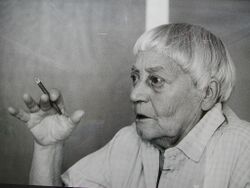Medicine:Françoise Mézières
Françoise Mézières (18 June 1909 – 17 October 1991) was an internationally renowned French physiotherapist.[1] She was also known for extensively practicing applied kinesiology. In 1947 she developed a physiotherapy technique, known as Mézières Method.[2]
Biography
Françoise Mézières was born on 18 June 1909 in Hanoi. She studied at the French School of Orthopedics and Massage, Paris. Mézières was “teaching and practising classical segmented physiotherapy.”[3]
Meanwhile, she found that the body's movement needs to be adjusted in accordance with its tonic system.[4] She emphasized the importance of “global stretch of muscle chains” through which all connecting parts of the body must be “stretched and readjusted at the same time.”[5][6]
Her physiotherapy techniques are in the nature of “postural reconstruction work”.[7] In 1947 she developed Mézières Method, an orthopedic form of bodywork, which tried to rebalance the different muscle and joint chains through guided stretching exercises.[8]
In 1976, Mezieres's theory and kinesiology practices gained worldwide recognition following the publication of the best-seller Le Corps a ses raisons by Therese Bertherat and Carole Bernstein.[1]
She died in Noisy-sur-École on 17 October 1991.
References
- ↑ 1.0 1.1 Robinson, Jacqueline (1997). Modern Dance in France: An Adventure 1920-1970. Oxfordshire: Taylor & Francis. p. 383. ISBN 978-9-057-02015-5. https://books.google.com/books?id=AUes3pBJXo8C. Retrieved 19 October 2022.
- ↑ Whitehouse, Mary Starks (2007). Authentic Movement: Moving the Body, Moving the Self, Being Moved: a Collection of Essays, Volume Two. London: Jessica Kingsley Publishers. p. 386. ISBN 978-1-843-10768-2. https://books.google.com/books?id=EpGLmzBI8JwC. Retrieved 19 October 2022.
- ↑ Bettany-Saltikov, Josette (5 April 2012). Physical Therapy Perspectives in the 21st Century: Challenges and Possibilities. Norderstedt, Germany: BoD – Books on Demand. p. 53. ISBN 978-9-535-10459-9. https://books.google.com/books?id=hcqgDwAAQBAJ. Retrieved 19 October 2022.
- ↑ McHose, Caryn (25 May 2006). How Life Moves: Explorations in Meaning and Body Awareness. Berkeley, California: North Atlantic Books. p. 136. ISBN 978-1-556-43618-5. https://books.google.com/books?id=BSUDAQAAQBAJ. Retrieved 19 October 2022.
- ↑ Bertherat, Therese (1989). The Body Has Its Reasons: Self-Awareness Through Conscious Movement. Rochester, Vermont: Inner Traditions / Bear & Co. p. 85. ISBN 978-0-892-81298-1. https://books.google.com/books?id=jgcDb4dgJi0C. Retrieved 19 October 2022.
- ↑ Postacchini, Franco (18 December 1998). Lumbar Disc Herniation. Heidelberg, Germany: Springer Science & Business Media. p. 357. ISBN 978-3-211-83118-2. https://books.google.com/books?id=i-An_XbHpJcC. Retrieved 19 October 2022.
- ↑ Bligny, Yves (16 September 2011). Bioharmonic Self-Massage: How to Harmonize Your Mental, Emotional, and Physical Energies. New York City: Simon and Schuster. p. NA. ISBN 978-1-594-77712-7. https://books.google.com/books?id=cFwoDwAAQBAJ. Retrieved 19 October 2022.
- ↑ Smith, LeCain W. (12 August 2014). Our Inner Ocean. Bloomington, Indiana: Archway Publishing. p. 72. ISBN 978-1-452-51868-8. https://books.google.com/books?id=l5qFBAAAQBAJ. Retrieved 19 October 2022.
 |


